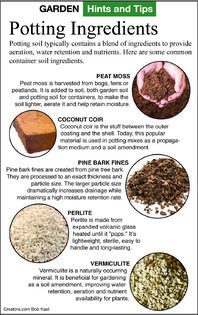The Greener View: Potting Mix
Potting Mix
Q: A gardener friend moved and left me with several bags of ingredients for making potting soil. I have never made potting soil before. What proportions should I use? Do these ingredients go bad at some point?
A: First, I want to make a slight distinction between potting soil and potting mix. When you use the word soil, it implies that one of the ingredients will be soil either from the garden or dug up from somewhere else. So, potting soil includes some dirt.
Potting mix, on the other hand, doesn't include any soil. It is a much lighter weight mix that is designed to allow for good water drainage and good air circulation in some kind of container.
When you are trying to make better garden soil, you may add some of the ingredients that we would use in a potting mix, but other potting mix ingredients don't work in the garden. The ingredients of a potting mix can be changed to match the type of plant you are trying to grow. For example, a cactus will get a different mix than a hibiscus.
Most of the bagged soil mixes at the garden center are going to have peat moss as the main ingredient. It holds water very well and still allows some water to drain away, letting air into the mix. However, some people think that peat bogs are being destroyed and that peat moss should not be used in soil mixes.
The often-recommended substitute for peat moss is coconut coir, also known as coconut peat. Like peat moss, it holds some water and allows the rest to drain. It is created from coconut husks that are left over from coconut oil and coconut water production. Coconuts are grown in many countries. Both palm oil trees and coconut palm trees are planted in areas that are destroying tropical jungles that are the habitat for orangutans. So, coconut coir may not be the best solution for potting mixes.
Pine bark fines are small pieces of pine bark less than 1/2-inch in size. They can be bought in bags or, in some areas, in bulk. Small amounts of other kinds of bark or larger pieces can also be used. Pine bark fines are a good renewable ingredient that hold water, allow drainage and help lower the pH of the mix so it is good for citrus, blueberries and azaleas.
The next most common ingredient is mature compost. You can make your own or buy it in bags. If you buy it, try to get several bags from different companies. You will find the quality varies considerably. A lot of the nutrients in the potting mix come from the compost.
Perlite and vermiculite are varieties of volcanic material that hold water and open soils for good water drainage. Vermiculite looks like small mica fragments, and it stays in place when mixed in. Perlite looks like white sand, but it is so light that it often floats to the surface of the flowerpot and washes over the pot when watered heavily or during a rain.
Fertilizers can be added according to the label directions. Slow-release fertilizer can last the whole summer for annuals.
Like I said, different plants grow best in different soil mixes. Some like really good drainage; some like a low pH; some like a lot of organic matter; and some like lots of fertilizer. The proportions you use will depend on what kinds of plants you use. One common mix you will hear about is the 5-1-1 mix. Usually, when you see such a designation, you will think N-P-K (nitrogen, phosphorus, potassium). In this instance, it is 5 parts pine bark fines, 1 part perlite and 1 part peat moss. It is a very good mix for citrus trees and many other types of plants.
One last word: All of the ingredients discussed here can be very dusty. They can cause lung problems if breathed in. Some of the ingredients can harbor fungi and fungi spores that can also cause lung problems. Wearing a mask when mixing or planting potting mixes is wise. Goggles for the eyes may also be a good idea. Wash your hands after mixing these ingredients, especially compost.
(SET IMAGE) jru032625adAP.jpg (END IMAGE)
========
Email questions to Jeff Rugg at info@greenerview.com. To find out more about Jeff Rugg and read features by other Creators Syndicate writers and cartoonists, visit the Creators Syndicate website at www.creators.com.
Copyright 2025 Jeff Rugg. Distributed By Creators.








Comments